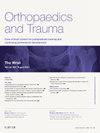翻修型全肘关节置换术:考生入门指南
Q4 Medicine
引用次数: 0
摘要
与传统的关节置换术相比,全肘关节置换术(TEA)的翻修率相对较高(5年翻修率为4%-7%)。翻修的原因最常见的是假体松动。要排除假体周围感染,就必须进行全面的检查,包括病史、检查、血液、X光片和关节组织或液体样本。在对 TEA 进行翻修前,必须考虑患者因素和软组织管理,以确保翻修后的种植体达到最佳效果并延长使用寿命。TEA翻修的手术策略包括单阶段或双阶段翻修、轴承交换、骨窗和支柱移植。本文章由计算机程序翻译,如有差异,请以英文原文为准。
Revision total elbow arthroplasty: a primer for exam candidates
Total elbow arthroplasty (TEA) has a relatively high revision rate compared to conventional joint arthroplasties (4–7% at 5 years). The cause for revision is most commonly implant loosening. A thorough work-up with history, examination, bloods, radiographs and joint tissue or fluid samples are all required to rule out peri-prosthetic infection. Patient factors and soft tissue management must be considered before revising a TEA to ensure the best outcome and longevity of the revised implant. Surgical strategies for TEA revision include single or two-stage revision, bearing exchange, bone windows and strut grafts.
求助全文
通过发布文献求助,成功后即可免费获取论文全文。
去求助
来源期刊

Orthopaedics and Trauma
Medicine-Orthopedics and Sports Medicine
CiteScore
1.00
自引率
0.00%
发文量
57
期刊介绍:
Orthopaedics and Trauma presents a unique collection of International review articles summarizing the current state of knowledge and research in orthopaedics. Each issue focuses on a specific topic, discussed in depth in a mini-symposium; other articles cover the areas of basic science, medicine, children/adults, trauma, imaging and historical review. There is also an annotation, self-assessment questions and a second opinion section. In this way the entire postgraduate syllabus will be covered in a 4-year cycle.
 求助内容:
求助内容: 应助结果提醒方式:
应助结果提醒方式:


